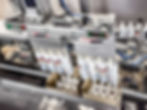Automation against the skilled labor shortage
- ninaliebig
- Oct 22
- 3 min read

How intelligent labeling systems secure production processes and compensate for staff shortages in industry
The shortage of skilled and semi-skilled workers is currently one of the greatest challenges facing industry. In the manufacturing sector in particular, it is becoming increasingly difficult to find qualified personnel for production, assembly, or machine operation. At the same time, production volumes and quality standards must not decline — a demanding balance that pushes many companies to their limits.
A sustainable solution lies in the automation of industrial processes, especially in product labeling. With intelligent labeling solutions, personnel requirements can be significantly reduced while efficiency, precision, and process reliability increase.
Labeling processes – small-scale, high-frequency, and error-prone
Product labeling accompanies the entire value chain — from goods receipt to production and shipping. It is essential for traceability, quality assurance, and legally compliant product declaration.
However, labeling is a detailed, high-frequency process: labels must be printed, positioned, and applied at exactly the right moment. Each manual intervention increases the risk of misplacement or downtime. In modern production environments, a purely manual process is no longer efficient or economical.
That’s why labeling automation is now considered a key component of a future-proof production strategy. It not only reduces personnel requirements but also ensures consistent quality and stable production processes throughout.
More efficiency through intelligent labeling automation
Modern labeling systems from b+b Automations- und Steuerungstechnik take over the entire control of the labeling process — from label printing and application to inspection and data collection.
Typical process optimizations include:
Automatic roll change to reduce downtime
Sensor and camera technology to verify label and cap presence in real time
Servo-driven units for precise capping and label application
User-friendly touch panel operation to minimize error rates and simplify training
Modular design to allow flexible adaptation to various product formats
A practical example is the FM200-VS labeling system, specifically designed for double-sided labeling and capping of 1-liter bottles. The system combines robust mechanical engineering with an integrated electronic control unit and offers intuitive operation via a 15.6" touch panel PC. Camera sensors check the presence of labels and caps, while faulty products are automatically rejected.
This demonstrates clearly: automation does not replace people — it supports them by reliably handling repetitive and error-prone tasks.
Sustainable labeling as a factor for the future
In addition to productivity and quality, sustainability is increasingly becoming a focus of modern labeling solutions. Energy-efficient control systems, optimized material usage, and the use of linerless labels all contribute to more resource-efficient production processes.
At the same time, investments in automation often pay off after a short period — thanks to lower personnel costs, reduced waste, and more stable production utilization.
b+b Automations- und Steuerungstechnik – your partner for customized labeling solutions
With more than 20 years of experience, b+b Automations- und Steuerungstechnik develops customized labeling systems and labeling machines for a wide range of industries. From label printing and application to serialization and fully automatic aggregation, b+b plans and implements tailor-made solutions — modular, durable, and Made in Germany.
Here, traditional mechanical engineering meets digital intelligence: Smart labeling technologies with QR or RFID codes enable seamless data capture along the entire supply chain, making labeling a strategic component of Industry 4.0.
Conclusion: Automation as a response to the skilled labor shortage
(Labeling) automation is far more than a technical upgrade — it is a key lever to counter the shortage of skilled workers in the industry, maintain high quality standards, and use resources efficiently.
Companies that invest today in intelligent labeling systems are creating the foundation for stable, future-proof production processes — independent of staffing shortages and market volatility.

